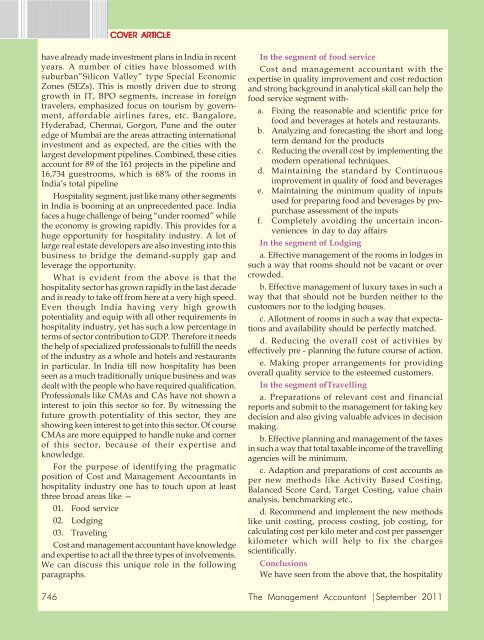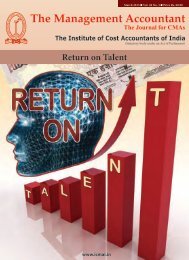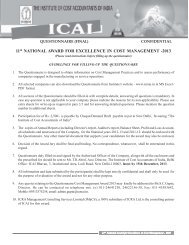This Issue - Icwai
This Issue - Icwai
This Issue - Icwai
Create successful ePaper yourself
Turn your PDF publications into a flip-book with our unique Google optimized e-Paper software.
COVER COVER ARTICLE<br />
ARTICLE<br />
have already made investment plans in India in recent<br />
years. A number of cities have blossomed with<br />
suburban”Silicon Valley” type Special Economic<br />
Zones (SEZs). <strong>This</strong> is mostly driven due to strong<br />
growth in IT, BPO segments, increase in foreign<br />
travelers, emphasized focus on tourism by government,<br />
affordable airlines fares, etc. Bangalore,<br />
Hyderabad, Chennai, Gorgon, Pune and the outer<br />
edge of Mumbai are the areas attracting international<br />
investment and as expected, are the cities with the<br />
largest development pipelines. Combined, these cities<br />
account for 89 of the 161 projects in the pipeline and<br />
16,734 guestrooms, which is 68% of the rooms in<br />
India’s total pipeline<br />
Hospitality segment, just like many other segments<br />
in India is booming at an unprecedented pace. India<br />
faces a huge challenge of being “under roomed” while<br />
the economy is growing rapidly. <strong>This</strong> provides for a<br />
huge opportunity for hospitality industry. A lot of<br />
large real estate developers are also investing into this<br />
business to bridge the demand-supply gap and<br />
leverage the opportunity.<br />
What is evident from the above is that the<br />
hospitality sector has grown rapidly in the last decade<br />
and is ready to take off from here at a very high speed.<br />
Even though India having very high growth<br />
potentiality and equip with all other requirements in<br />
hospitality industry, yet has such a low percentage in<br />
terms of sector contribution to GDP. Therefore it needs<br />
the help of specialized professionals to fulfill the needs<br />
of the industry as a whole and hotels and restaurants<br />
in particular. In India till now hospitality has been<br />
seen as a much traditionally unique business and was<br />
dealt with the people who have required qualification.<br />
Professionals like CMAs and CAs have not shown a<br />
interest to join this sector so for. By witnessing the<br />
future growth potentiality of this sector, they are<br />
showing keen interest to get into this sector. Of course<br />
CMAs are more equipped to handle nuke and corner<br />
of this sector, because of their expertise and<br />
knowledge.<br />
For the purpose of identifying the pragmatic<br />
position of Cost and Management Accountants in<br />
hospitality industry one has to touch upon at least<br />
three broad areas like —<br />
01. Food service<br />
02. Lodging<br />
03. Traveling<br />
Cost and management accountant have knowledge<br />
and expertise to act all the three types of involvements.<br />
We can discuss this unique role in the following<br />
paragraphs.<br />
In the segment of food service<br />
Cost and management accountant with the<br />
expertise in quality improvement and cost reduction<br />
and strong background in analytical skill can help the<br />
food service segment witha.<br />
Fixing the reasonable and scientific price for<br />
food and beverages at hotels and restaurants.<br />
b. Analyzing and forecasting the short and long<br />
term demand for the products<br />
c. Reducing the overall cost by implementing the<br />
modern operational techniques.<br />
d. Maintaining the standard by Continuous<br />
improvement in quality of food and beverages<br />
e. Maintaining the minimum quality of inputs<br />
used for preparing food and beverages by prepurchase<br />
assessment of the inputs<br />
f. Completely avoiding the uncertain inconveniences<br />
in day to day affairs<br />
In the segment of Lodging<br />
a. Effective management of the rooms in lodges in<br />
such a way that rooms should not be vacant or over<br />
crowded.<br />
b. Effective management of luxury taxes in such a<br />
way that that should not be burden neither to the<br />
customers nor to the lodging houses.<br />
c. Allotment of rooms in such a way that expectations<br />
and availability should be perfectly matched.<br />
d. Reducing the overall cost of activities by<br />
effectively pre - planning the future course of action.<br />
e. Making proper arrangements for providing<br />
overall quality service to the esteemed customers.<br />
In the segment ofTravelling<br />
a. Preparations of relevant cost and financial<br />
reports and submit to the management for taking key<br />
decision and also giving valuable advices in decision<br />
making.<br />
b. Effective planning and management of the taxes<br />
in such a way that total taxable income of the travelling<br />
agencies will be minimum.<br />
c. Adaption and preparations of cost accounts as<br />
per new methods like Activity Based Costing,<br />
Balanced Score Card, Target Costing, value chain<br />
analysis, benchmarking etc.,<br />
d. Recommend and implement the new methods<br />
like unit costing, process costing, job costing, for<br />
calculating cost per kilo meter and cost per passenger<br />
kilometer which will help to fix the charges<br />
scientifically.<br />
Conclusions<br />
We have seen from the above that, the hospitality<br />
746 The Management Accountant |September 2011




